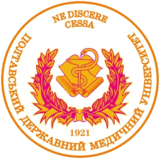Будь ласка, використовуйте цей ідентифікатор, щоб цитувати або посилатися на цей матеріал:
http://repository.pdmu.edu.ua/handle/123456789/16902Повний запис метаданих
| Поле DC | Значення | Мова |
|---|---|---|
| dc.contributor.author | Dubinina, Vira | - |
| dc.contributor.author | Дубініна, Віра Олександрівна | - |
| dc.date.accessioned | 2021-11-05T13:39:15Z | - |
| dc.date.available | 2021-11-05T13:39:15Z | - |
| dc.date.issued | 2019-01 | - |
| dc.identifier.citation | Dubinina V. Hermeneutics H.-G. Gadamer as a universal philosophy of understanding / V. Dubinina // Схід. – 2019. – № 1 (159). – С. 5–9. | uk_UA |
| dc.identifier.issn | 2411-3093 (Online) | - |
| dc.identifier.other | 1728-9343 (Print) | - |
| dc.identifier.uri | http://repository.pdmu.edu.ua/handle/123456789/16902 | - |
| dc.description.abstract | Considered the hermeneutic project of H.-G. Gadamer as the final phase of the development of the circle of ideas of the German philological hermeneutics of the ХІХ-ХХ century. The philosophy of language and the doctrine of understanding and interpretation are explored in connection with the development of philological ideas within the framework of the phenomenological school. The relationship between Gadamer's position and representatives of various linguistic theories of the early twentieth century is shown. The concept of understanding is presented as a key element of the hermeneutic process. Gadamer's hermeneutics is analyzed in the context of his conservative position and his interpretation of Platonic philosophy. Formation of the circle of ideas that formed the basis of the philosophical hermeneutics of H.-G. Gadamer is an integral part of the notion of the essence of language and understanding of its role in the formation of meaning and the entire spiritual culture of mankind, as well as from the concepts of human personality, its creation and development. Consideration of such issues is fundamental to revealing the real role that the hermeneutic project has played and continues to play in the development of European philosophy. The relevance of the theme chosen is determined by the role that the philosophical project of H.-G. Gadamer plays in the development of contemporary ideas about the importance of humanitarian knowledge and, above all, philosophy in the formation of man as such. Gadamer's philosophical hermeneutics with the passage of time only increases its importance for the development of philosophical discourse, thereby confirming its great euristic potential. As in modern Ukrainian philosophy, the development of the problems of understanding, first of all, understanding of the semantic component of human activity in the most diverse fields - from the sphere of art to political discourse, has become more relevant than ever. But in our day one can observe some limitations in understanding the significance and relevance of the Gadameric heritage, the study of which is often of a formal nature; the thinker himself and his works are referred to as a kind of 'figure of contention', without the necessary reflection and further development. | uk_UA |
| dc.description.abstract | Формування кола ідей, що лягли в основу філософської герменевтики Г.-Ґ. Ґадамера, є невід'ємною частиною поняття сутності мови і розуміння її ролі у формуванні сенсу і всієї духовної культури людства, а також концепцій людської особистості, її створення і розвитку. Філософська герменевтика Ґадамера з часом лише збільшує своє значення в розвитку філософського дискурсу, тим самим підтверджуючи свій великий евристичний потенціал. Як і в сучасній українській філософії, розвиток проблем розуміння, насамперед, розуміння смислової складової людської діяльності в найрізноманітніших сферах - від сфери мистецтва до політичного дискурсу - є сьогодні гостро актуальним. Але в наші дні можна спостерігати певні обмеження в розумінні значущості й актуальності ґадамерівської спадщини, вивчення якої часто має формальний характер. Сам мислитель і його твори згадуються як своєрідна "фігура розбрату", без необхідного відображення і подальшого розвитку. У статті розглядається герменевтичний проект Г.-Ґ. Ґадамера як завершальна фаза розвитку кола ідей німецької філологічної герменевтики ХІХ-ХХ ст. Філософію мови і вчення про розуміння та інтерпретацію досліджено у зв'язку з розвитком герменевтичних ідей в рамках феноменологічної школи. Показано взаємозв'язок позиції Ґадамера з представниками різних лінгвістичних теорій початку ХХ ст. Поняття "розуміння" подано як ключовий елемент герменевтичного процесу. Герменевтика Ґадамера аналізується в контексті консервативної концепції філософа і його доробків у царині інтерпретації платонівської філософії. | uk_UA |
| dc.language.iso | en | uk_UA |
| dc.subject | hermeneutics | uk_UA |
| dc.subject | understanding | uk_UA |
| dc.subject | interpretation | uk_UA |
| dc.subject | language | uk_UA |
| dc.subject | semantics | uk_UA |
| dc.subject | platonism | uk_UA |
| dc.subject | герменевтика | uk_UA |
| dc.subject | розуміння | uk_UA |
| dc.subject | інтерпретація | uk_UA |
| dc.subject | мова | uk_UA |
| dc.subject | смисл | uk_UA |
| dc.subject | платонізм | uk_UA |
| dc.title | Hermeneutics H.-G. Gadamer as a universal philosophy of understanding | uk_UA |
| dc.title.alternative | Герменевтика Г.-Ґ. Ґадамера як універсальна філософія розуміння | uk_UA |
| dc.type | Article | uk_UA |
| dc.identifier.doi | 10.21847/1728-9343.2019.1(159).157988 | - |
| dc.subject.udc | 101.1 DOI: 10.21847/1728-9343.2019.1(159).157988 | uk_UA |
| Розташовується у зібраннях: | Наукові праці. Кафедра філософії і суспільних наук | |
Файли цього матеріалу:
| Файл | Опис | Розмір | Формат | |
|---|---|---|---|---|
| Dubinina_Hermenevtyka_Hadamera.pdf | 355,73 kB | Adobe PDF | Переглянути/Відкрити |
Усі матеріали в архіві електронних ресурсів захищені авторським правом, всі права збережені.



